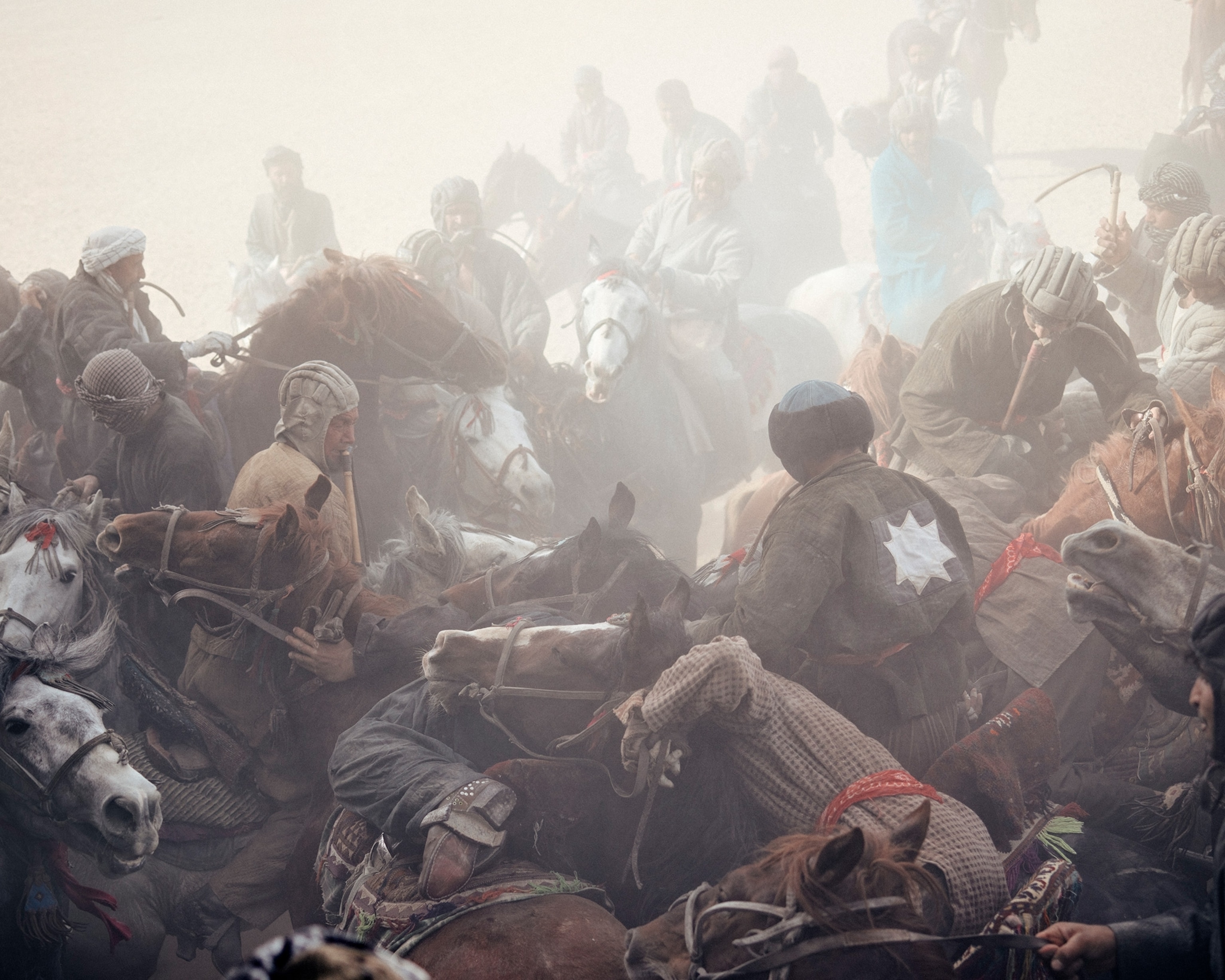
Trouble lurks for Afghanistan’s beloved ‘goat grabbing’ national sport
As the Taliban gains ground, buzkashi—an ancient contest akin to polo with a carcass as the ball—is losing.
Mazar-e-Sharif, Afghanistan — When Khaibar Akbarzada enters the arena, a groundswell of murmurs and shouts arise from fans who instantly recognize his hulking frame and all-black uniform, emblazoned with a white number 7. In one forceful motion, the young contender swings up onto a horse and bolts into action.
It’s a Friday in early December 2020, and he’s playing the ancient game of buzkashi, the national sport of Afghanistan. Major matches are held in winter after Friday prayers. About 80 players from across northern Afghanistan, or chapandazan as they’re known, are swarming on horseback midfield. Somewhere in the scrum of mud and grunts and pulsing hoofs is the ball: the carcass of a calf or goat that’s been decapitated, gutted, and stitched up.
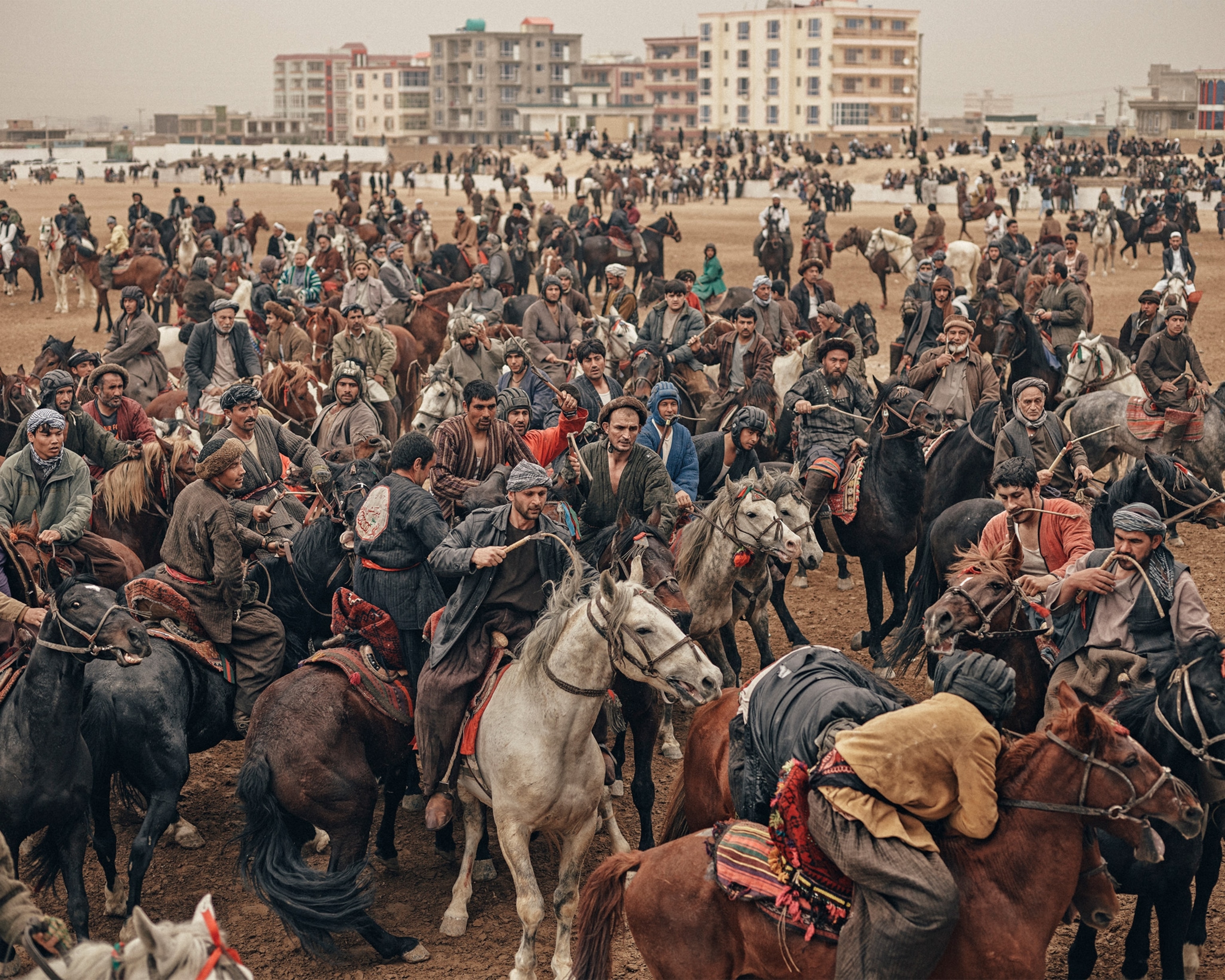
The goal is simple, though getting there can be brutal. To score, a rider must grab the “ball,” round a flag at the far end of the field, and drop the carcass into a chalked circle, called the “circle of justice.” Norms exist, and foul play is frowned upon, but opposing riders will do almost anything to prevent the drop.
During their five-year rule from 1996 to 2001, the ultraconservative Taliban banned buzkashi and many other forms of entertainment as “immoral." Now, 20 years since the fall of the Taliban leadership, and with U.S. forces drawing down from their longest war, Taliban militants control or are contesting nearly half the country—including large swaths of the north, where buzkashi has traditionally been played. In government-held areas, the Taliban are carrying out targeted assassinations and bombing roads and public gatherings to sow fear. As the country slides deeper into chaos, and Taliban advances curtail the pastime, chapandazan must take ever greater risks to earn a meager livelihood and keep tradition alive.
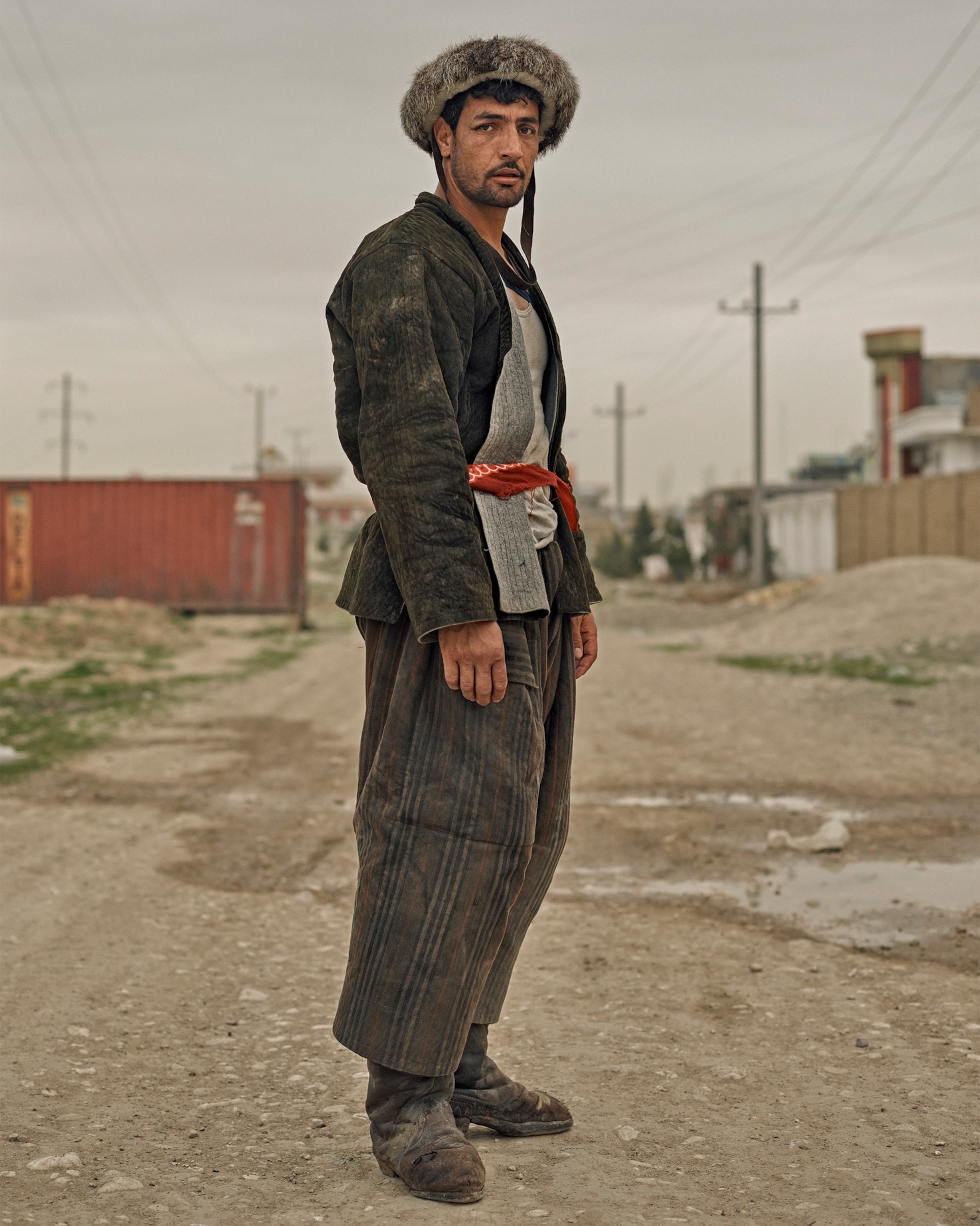
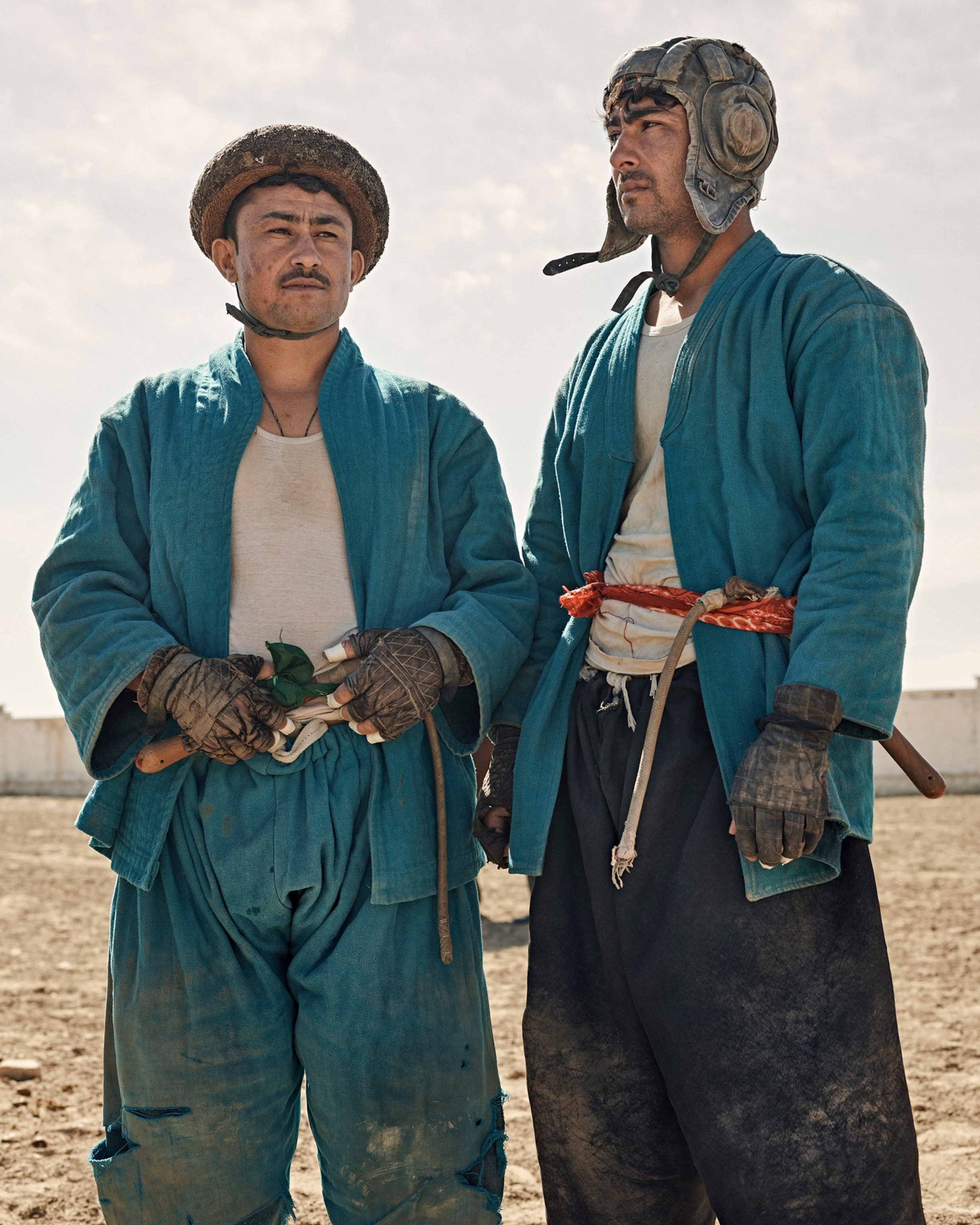
Indeed, it had taken Khaibar (riders are generally known by their first names) more than 10 hours to reach Mazar-e-Sharif from Kunduz—three times the usual driving time—because of gun battles along the highway. His father, the only person he apprises of his exact travel plans, asked him to turn back. But the winter season was just underway, and the 24-year-old with hands the size of meat cleavers and a lot to prove was undeterred.
Khaibar comes from a storied buzkashi pedigree that has endured despite the war’s toll. His uncle, Ahmad Gul, a champion from Kunduz province known all over Afghanistan in the 1970s, was killed in an ambush during the civil war—one of 14 family members lost to conflict over the past 40 years.
In 2015, when the Taliban briefly overran Kunduz city, Khaibar’s family hunkered down in a basement for two weeks as fighting raged and U.S. air strikes shook the ground. The militants have since rebounded to seize much of the surrounding countryside, and the violence is “getting worse by the day,” he says.
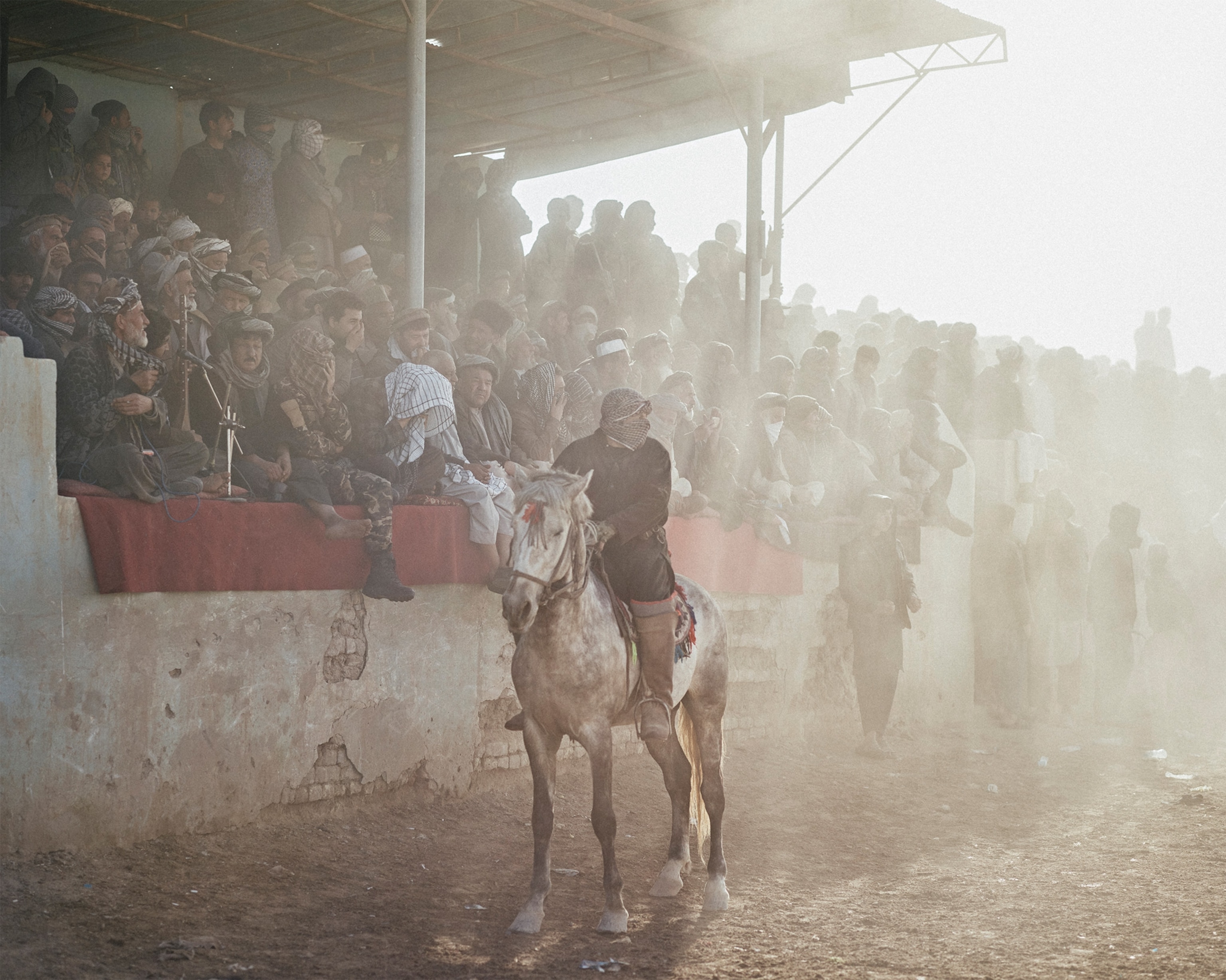
As this day’s match intensifies, Khaibar struggles to find his rhythm. His horses, provided by local supporters, are smaller than expected, poorly matched to his size and swashbuckling style. His efforts are stymied further by a group of five brothers from Samangan province who gang up on him and yank at his hands and jersey every time he seizes the calf. At one point, he’s about to snatch it, when two of them whip his horse’s flank furiously to send it lurching away. The crowd jeers.
“These players are spoiling the match with fouls,” says Hameed Rassekh, a local devotee, with disgust. “This is dirty play.”
After nearly 10 minutes of struggle, a rider heaves the calf up, secures it under his leg, and scores. He saunters up to the grandstand to collect his prize of 500 Afghanis (about $6). The next round is already in motion, part of a repeating cycle of play that will last until dusk.
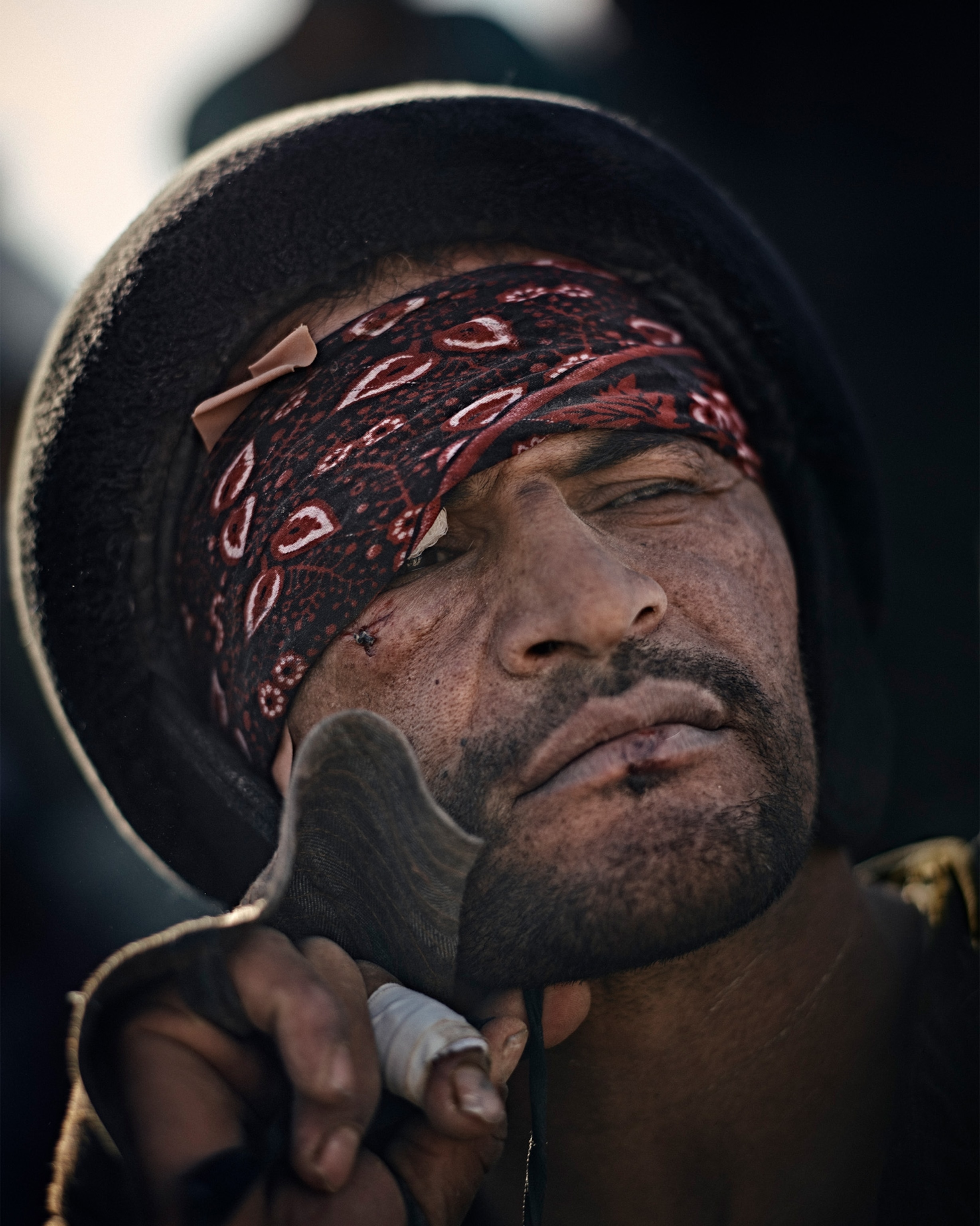
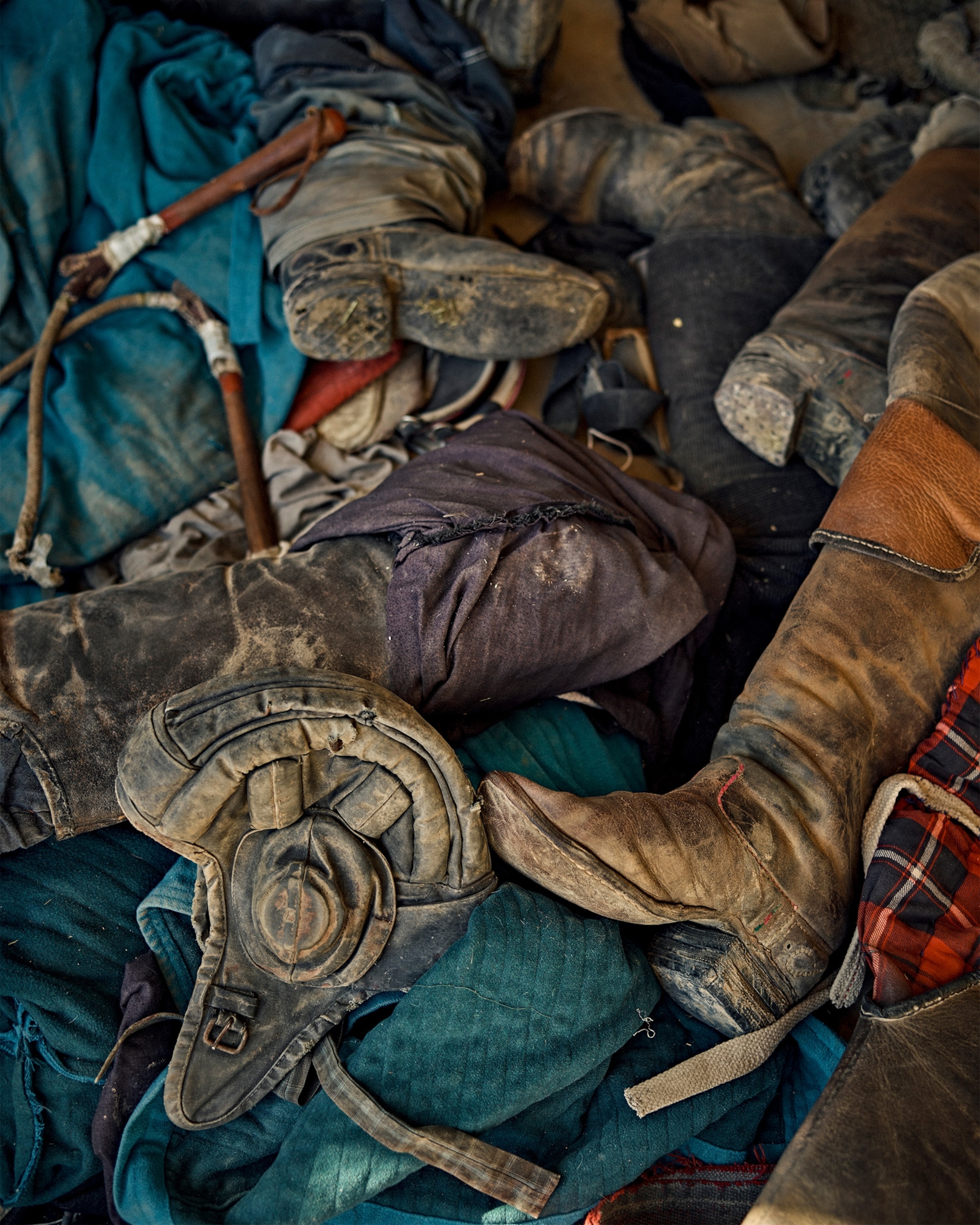
Game theory
No one is certain how buzkashi (or “goat grabbing” in Dari, the version of Persian language spoken in much of Afghanistan) originated on the steppes of Central Asia. One widely held theory is that it evolved centuries ago as a battle exercise for Mongol raiders. These days, it’s played across Central Asia, with a few twists. In Kyrgyzstan and Kazakhstan, they play a team format in which the calf or goat is flung into raised goals. (Fake carcasses are increasingly in use to appease animal rights groups). In western China, the mounts are yaks rather than horses. (Related: Nomads in Kyrgyz survive in one of the most remote, bewitching landscapes on Earth.)
Buzkashi is “governed and regulated by its own traditions, by the social context and its customs, and by the implicit understandings among the players. If you need the protection of an official rule book, you shouldn't be playing,” Tamim Ansary, an Afghan American author, writes in his book, Game Without Rules. “Two hundred years ago, buzkashi offered an apt metaphor for Afghan society. The major theme of the country's history since then has been a contention about whether and how to impose rules on the buzkashi of Afghan society.”
No figure embodies buzkashi more than Abdul Rashid Dostum, the marshal of Afghan armed forces. An ethnic Uzbek gas-field-worker-turned-militia-commander, he first fought the U.S.-backed mujahideen in the 1980s, then allied with Islamist radicals and later the Taliban during the civil war, before switching sides to join the Northern Alliance. The alliance teamed up with the U.S. and toppled the Taliban regime in 2001; Dostum famously led U.S. Green Berets on cavalry charges.
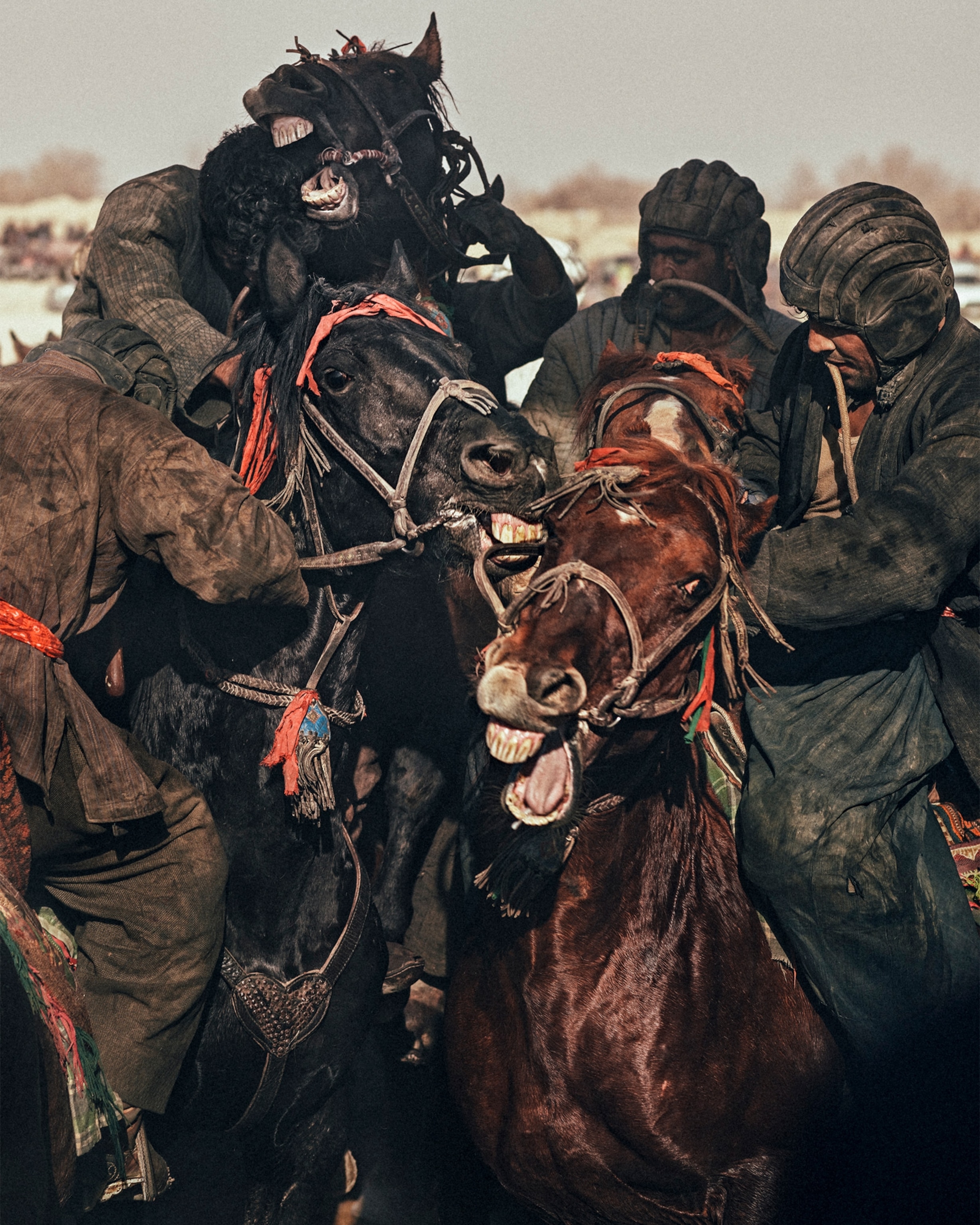
In the aftermath of the war, he and another fearsome warlord, Mohammad Qasim Fahim, an ethnic Tajik, channeled some of the U.S. and international reconstruction money that poured into the country to become top patrons of buzkashi (Fahim died in 2014). They lavished hundreds of thousands of dollars on riders and facilities and sourced prime horses from Central Asian countries to replenish Afghan stocks decimated by the war.
For all the harsh treatment they endure in matches, buzkashi stallions are prized for their hard-charging spirit. Leading sponsors have been known to pay high five-figures for a single horse, the accepted wisdom being that success in the arena is “80 percent horse, 20 percent rider.” Dedicated grooms feed and care year-round for the animals—symbols of power whose performances boost the social standing their owners.

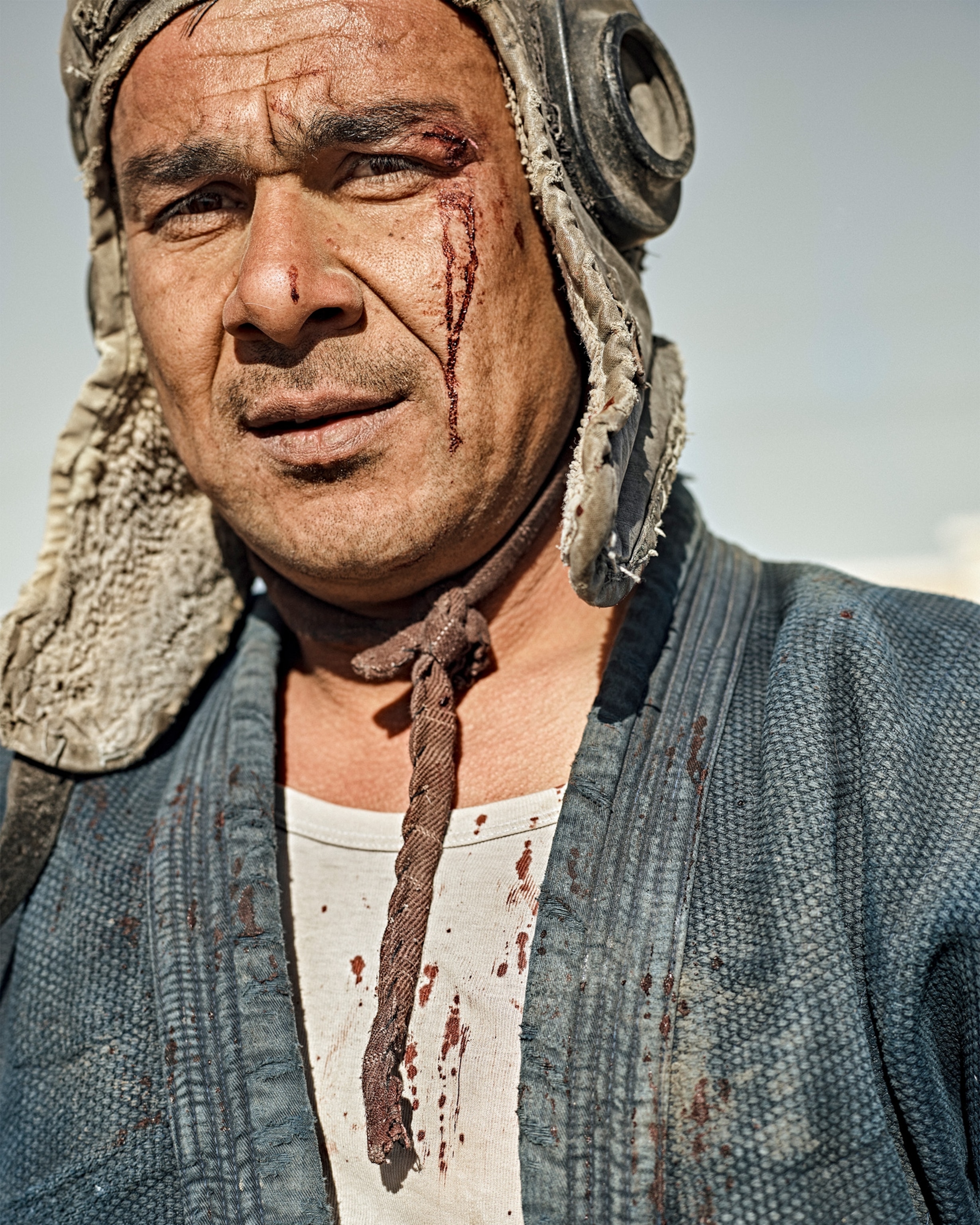
Both Dostum and Fahim used buzkashi to assert influence over their respective ethnic groups. In 2016, Dostum publicly assaulted a political opponent at a buzkashi match in the northwestern city of Sheberghan, his powerbase. More often, though, buzkashi serves as a source of largesse. In addition to providing free public entertainment, the leaders fostered better competition by investing in their riders and doling out large prizes. Winners could take home fistfuls of U.S. greenbacks and, on occasion, the keys to a new truck.
But last December, more than a month into the 2020-21 season, with the Taliban’s resurgence keeping many players from traveling far and wide to compete, buzkashi had yet to begin in Sheberghan. Dostum was said to be away fighting Taliban in a troubled corner of the province, and several other mainstay venues had been shut down by the Taliban.
For top northern competitors with families to support and fewer places to play, Mazar-e-Sharif, the largest urban center in the region, which still is firmly in government control, remains the citadel of the sport.
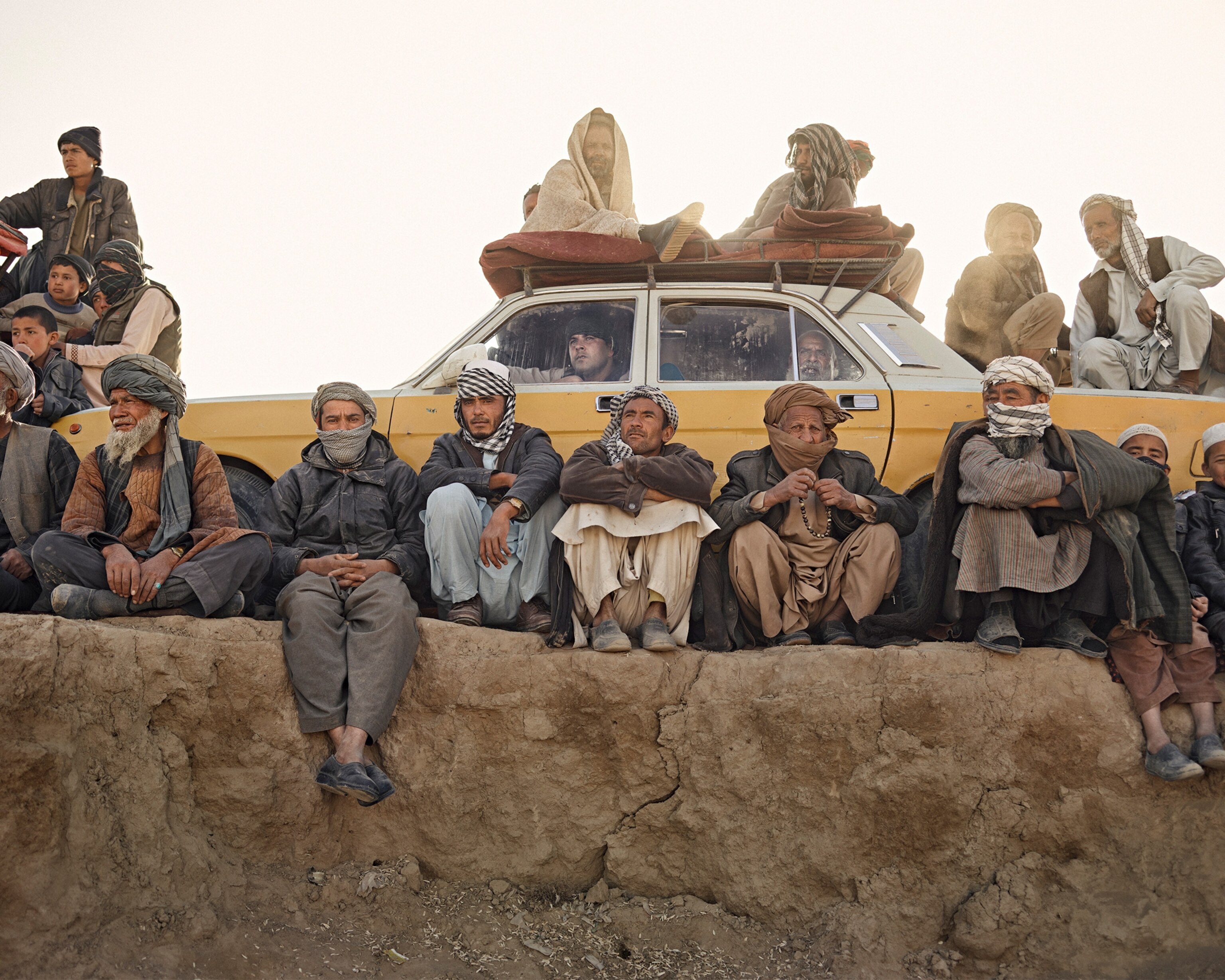
An adored champion
Public faith in the Friday match in Mazar-e-Sharif (or Mazar, as it’s better known to Afghans) is restored by Gulbuddin, an aging champion adored by fans and Khaibar’s main rival. After scoring several times late in the match, despite the efforts by the Samangan brothers to stop him, Gulbuddin saves his best flourish for the final round, which features the biggest prize: $100. (Matches last until the sponsors’ prize money or the supply of goats and calves run out—generally about two hours.)
Six minutes of grinding intensity go by before Gulbuddin snatches the calf and breaks away from the horde. Holding it with two hands and leaning back in the saddle, with a whip clenched in his teeth to keep balance, he rounds the flag and charges into a gauntlet of blockers massed in front of the goal. With deft maneuvering into imperceptible gaps, he smashes through and drops the calf in the circle. His arm shoots skyward in victory.
Fans bound into the muddy arena. Over in the parking lot, Gulbuddin is mired in a sea of male admirers jostling for selfies and shrieking his name: “Long live Gulbuddin!” In a land of creeping fear and insecurity, the local sports star has given them a moment to celebrate—a clean score, executed with skill and tenacity.
The last time I saw Gulbuddin, in early 2017, he was on the sidelines. A soft-spoken Pashtun farmer in an ethnic Tajik stronghold, his popularity had sparked the jealousy of Qurban Shah, a military commander who ordered his riders to thwart Gulbuddin at all costs, even hitting him in the face with their whips. When that didn’t stop him, threats followed.
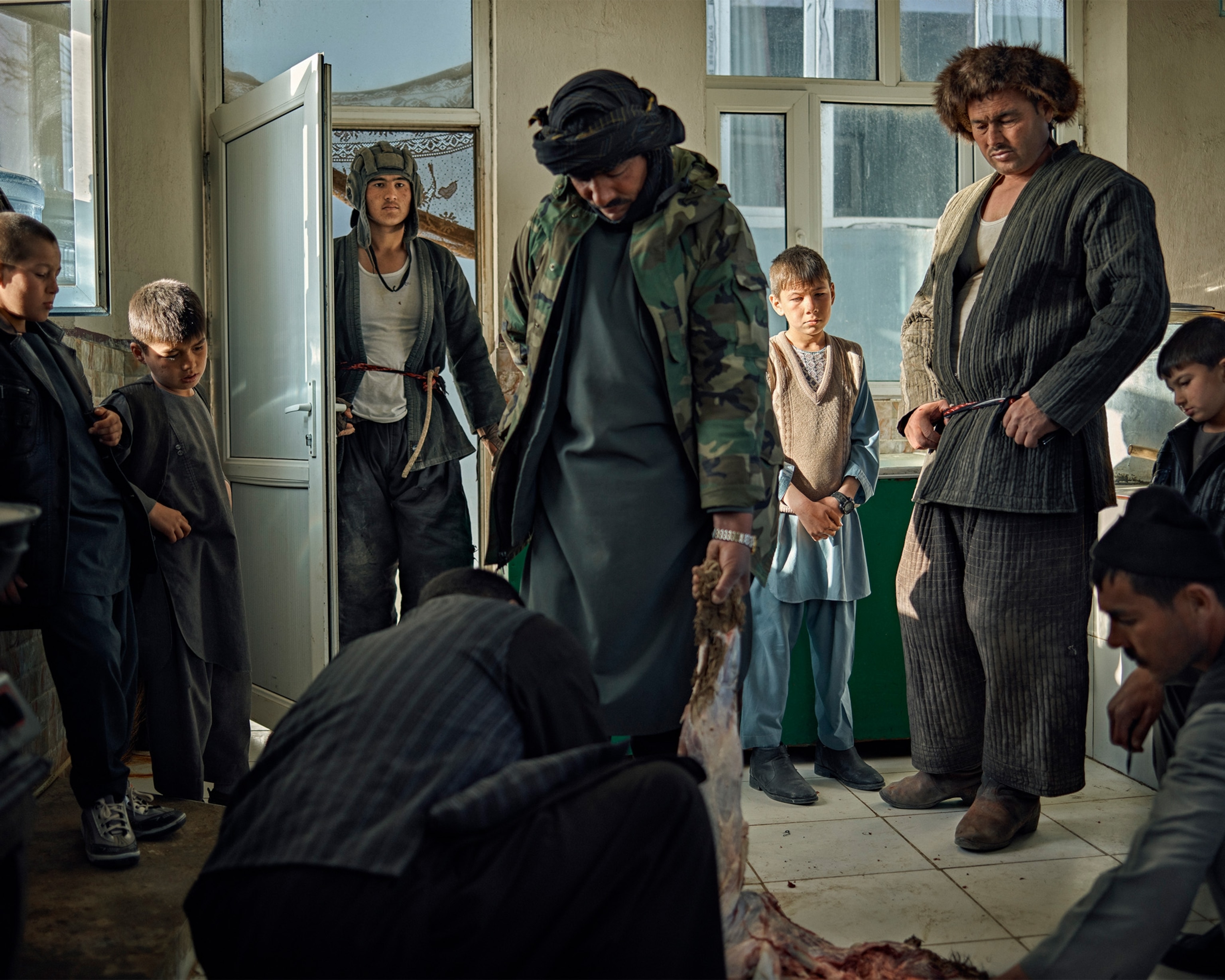
Gulbuddin took his brilliance instead to the hinterlands, where some of the purest buzkashi is played, uncomplicated by money and egos. In February 2017, I watched him dominating a match outside the crumbling walls of Balkh, an ancient Silk Road city sacked by the great conqueror Genghis Khan in 1220, and again by Timur, the ruler who tried to restore his empire, in 1370. Balkh is now in Taliban hands—one of a growing list of places where buzkashi is no longer played.
“Now people are afraid of a suicide bombing at the match,” says Ghulam Mohammad Aylaqi, Gulbuddin’s sponsor in Mazar, a 77-year-old former government minister and businessman who made his money manufacturing shoes. He recalls the golden days of the pre-war era, when buzkashis in the north could attract upwards of 700-800 riders—and sometimes thousands—as featured entertainment at weddings in the highlands of Badakhshan. “Even women would come!” he says.
No women are present today. Though not formally forbidden from attending buzkashi, it would be considered improper for a woman to be seen at such a loutish, all-male event.
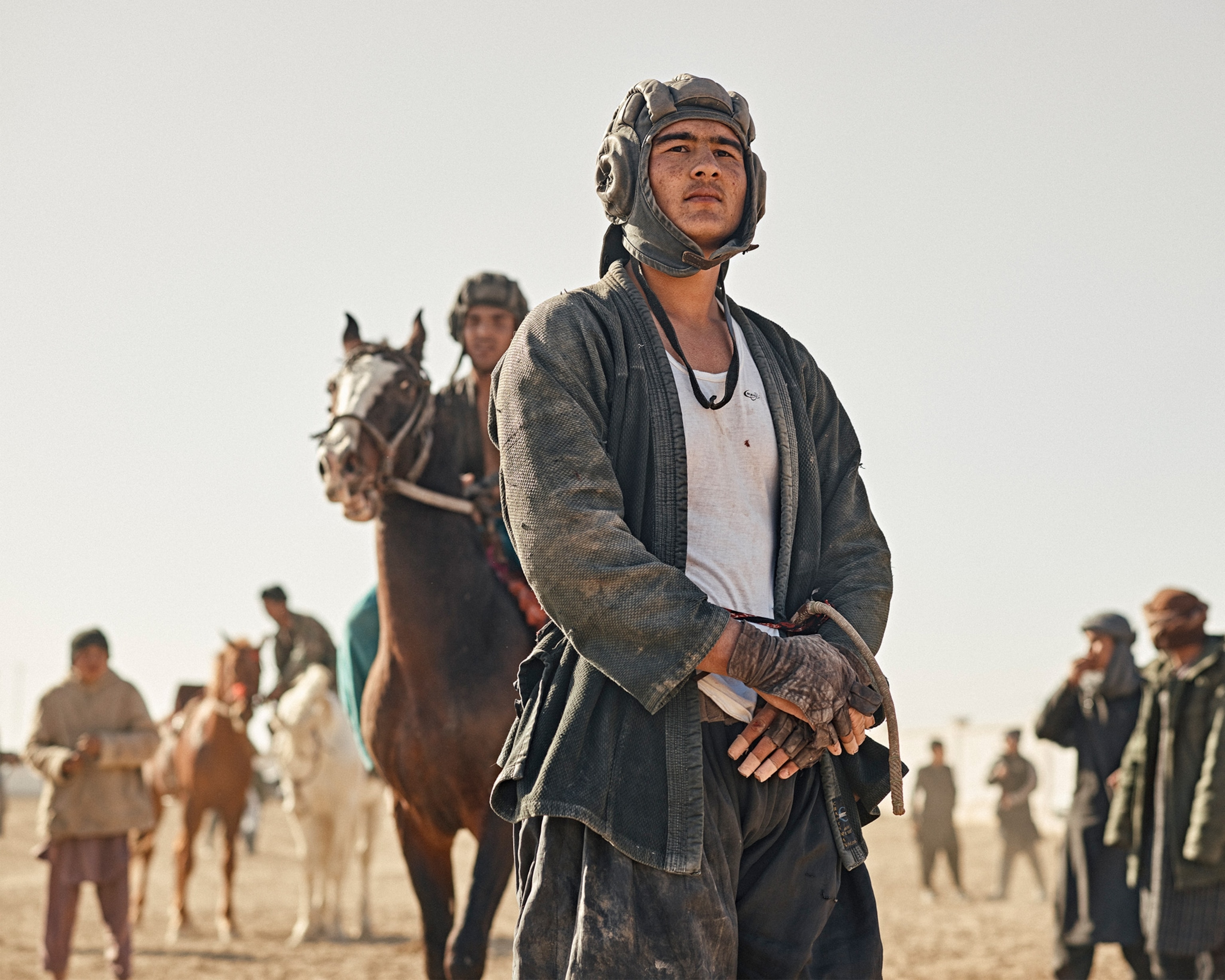

Over the decade that I’ve tracked the sport, I’ve never seen a female fan or participant, and any time I’ve visited the home of a chapandaz, wives remain out of sight, as is customary.
At a dinner at his home after the Friday match, Gulbuddin’s sponsor, Aylaqi, sits in the center of a large room in a gilt chair as half a dozen riders, including Khaibar, and their entourages gather on the floor to pay respects. Though rivals, Gulbuddin and Khaibar are cordial and complimentary outside the arena.
Aylaqi thinks the increase of foul play at buzkashi matches is a symptom of the country’s general descent into lawlessness. As servants hand out heaping plates of lamb and pulao, an aromatic rice dish laced with raisins and carrots, a video recording of the match is played back to highlight the fouls perpetrated by the Samangan brothers. The riders tsssk! and shake their heads. One man jumps up to make a cell phone recording to shame the Samangans on social media.
“Skill is essential, but the most important thing is morals,” explains Sarwar, a respected player. “Everyone at the match is a judge of character. This is why everyone loves Gulbuddin. He is a true champion.”
On the road again
The next Friday, Khaibar turns up in Kabul, the Afghan capital, after another ten-hour-plus drive through stretches of Taliban country and a high pass over the Hindu Kush mountains that divide the country. He’s nonetheless in a good mood: There’s no doubt his horses would be strong this time around. His sponsor, Qais Hassan, a rich property developer and former member of parliament, has spared no expense building one of the best stables in Afghanistan.
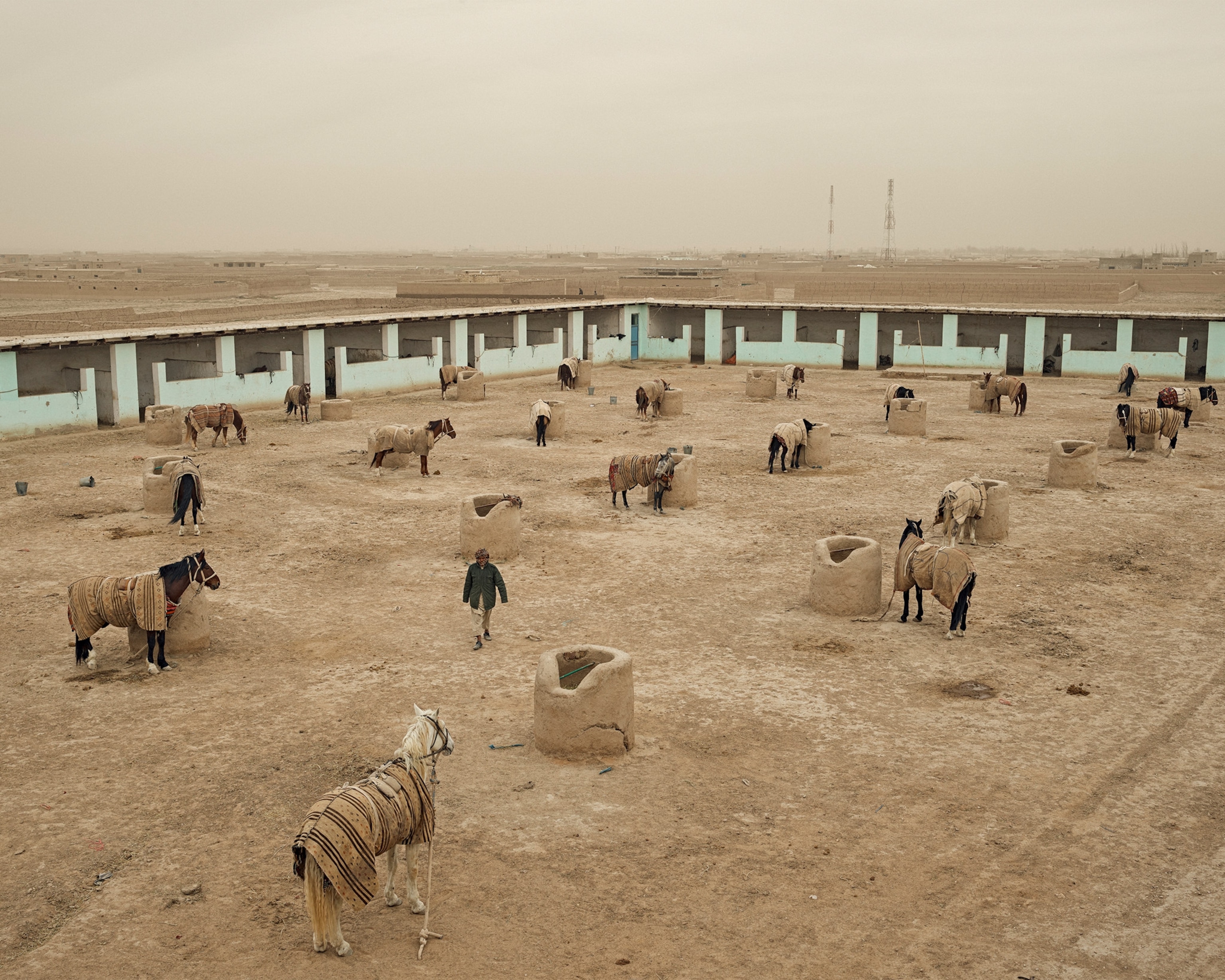
The buzkashi is held in a tight, walled arena in the north of the city. As buzkashis go, it’s a cage match. Minutes into the action, the man who marks the chalk circle is smashed to the ground by a charging horse, while a gang of local riders in red jackets are hell-bent on showing Khaibar whose turf he’s on. Every time he gets near the calf, he’s engulfed by a tide of opponents who rip at his jacket and arms—blatant fouls. His poise under attack is extraordinary.
Khaibar manages a pair of scores that light up the crowd, a raucous mix of off-duty police officers, war veterans, and scruffy kids. But the outsider’s popularity only stokes the locals’ effort to stop him, and with few allies on Hassan’s payroll to break a path, there’s only so much Khaibar can muster. Near the end of the match, he loses the calf trying to punch through one last time. The red rider who escapes with it goes on to score virtually uncontested.
On one side of the grandstand, a jowly Tajik commander laughs with his friends; on the other, Qais Hassan is sulking. Khaibar is one of the top riders in the country, with horses to match, but it’s not enough against overwhelming numbers and foul play. “You couldn’t see how they were cheating,” he fumes.
Settling a score
One upside of having money and influence is that fresh opportunities can be conjured on short notice. Hassan and his friends immediately start organizing their own impromptu buzkashi to set the score straight. The red jackets from Kabul are all invited, as are leading riders from the central provinces.
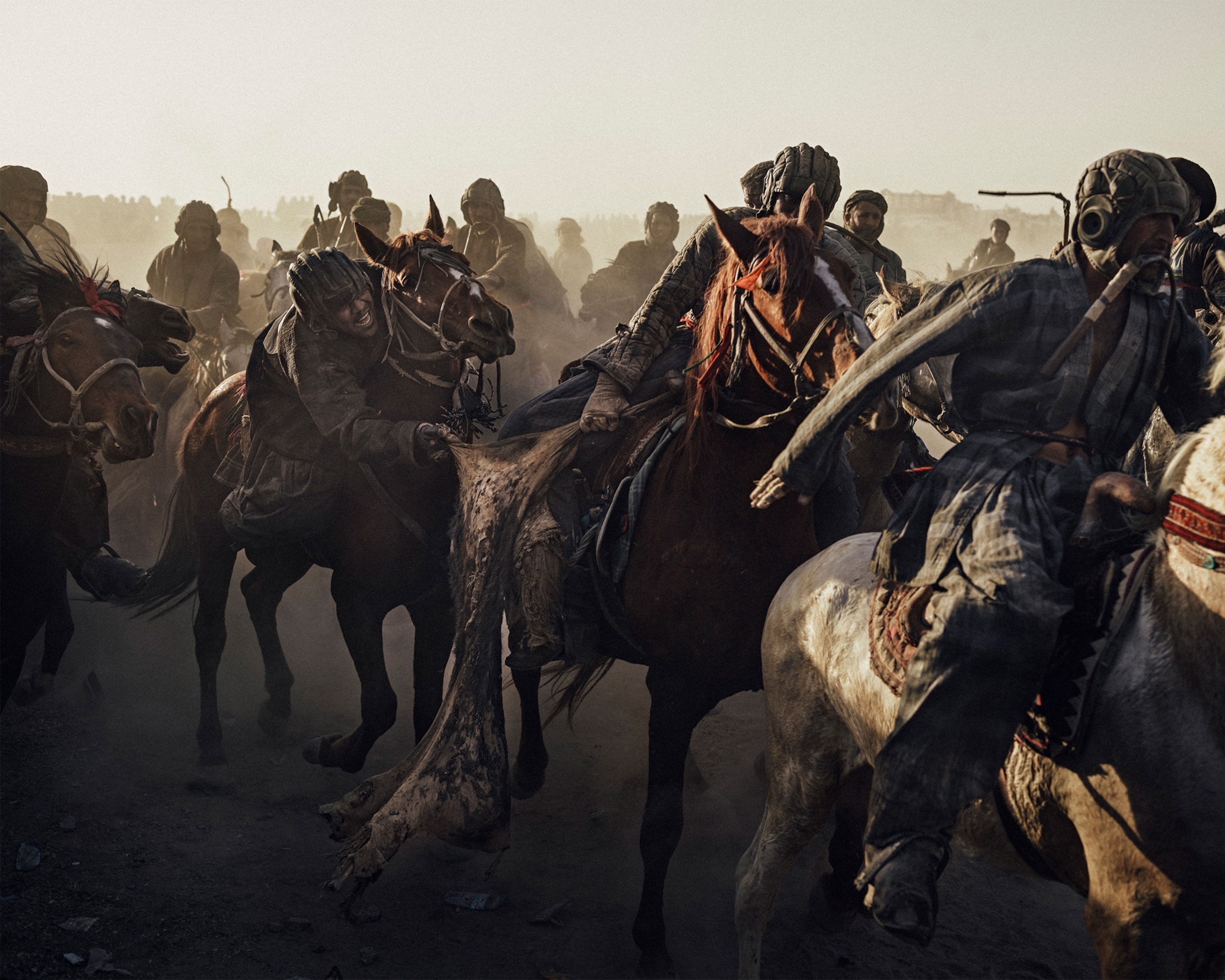
In hope of ensuring a win for his riders, Hassan summons Khaibar’s older brother from Kunduz. A star in his own right, he’s also named Gulbuddin but is better known as Kalakov (Afghan slang for the Russian-made Kalashnikov assault rifle) for his hard-nosed style of play.
Four days later, Khaibar, Hassan’s son, Faisal, and I are slashing through Kabul traffic in a convoy of armored SUVs, two pick-ups bristling with armed bodyguards front and rear. We pass a giant billboard for the new national buzkashi league, a weeks-long, televised tournament scheduled for the spring that will see provincial teams go head-to-head in Kabul for hefty prizes and national bragging rights.
The high-stakes contest excites Khaibar, offering him a rare chance to compete against all the other top riders in one place—assuming intensified Taliban violence and COVID-19 don’t become spoilers. (The pandemic cut short last spring’s event.)
About an hour’s drive southwest of the capital, in Paghman district, the road winds up to a barren plateau flanked by snow-capped peaks where riders are warming up their mounts. Hassan and his friends watch from rugs spread atop a rocky bluff. Most of the red riders are no-shows. Perhaps they sensed the odds would not be in their favor.
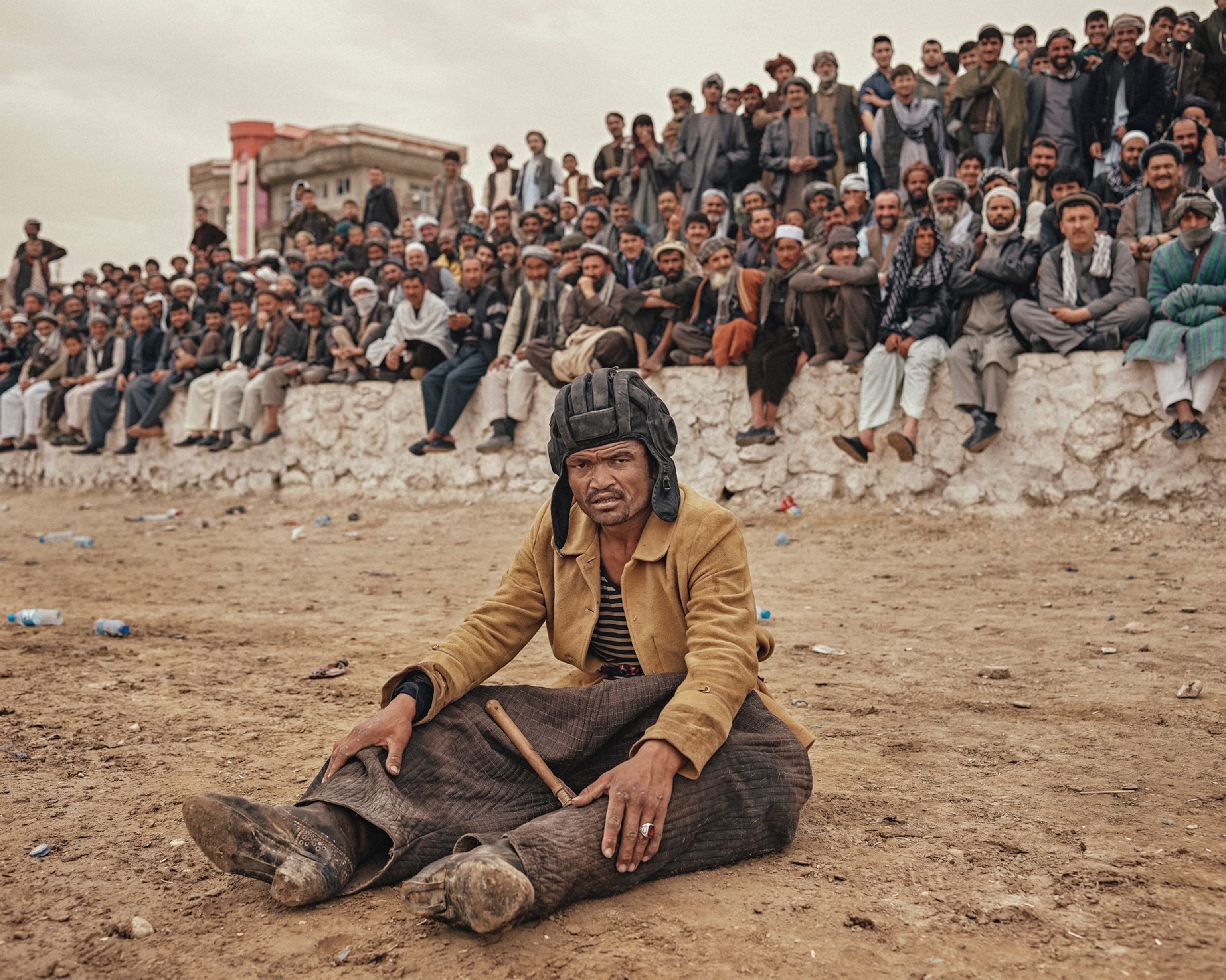
Khaibar begins the match with a score. Gulbuddin soon counters, then Khaibar strikes again. A good-natured sibling rivalry takes over. In one round, they battle for control of the calf, jerking back and forth, seemingly on the verge of falling off their horses, until a calf leg rips away from the carcass. Play spills out of bounds as horses charge up a hillside, sending spectators tumbling over a ledge. Gulbuddin wins the final round, much to Hassan’s pleasure.
To Khaibar’s relief, he tallied a game-high seven scores on the day, two more than his brother. Their prizes: $200 and $160, respectively. The rest of the night is spent around a wood stove revisting highlights and talking about upcoming buzkashis. Rumor is that Dostum might start the Sheberghan season the following week, a prospect met with mixed feelings. The last time Khaibar traveled on that highway, he passed a Taliban checkpoint. On the other hand, when Dostum is hosting, fat winnings are guaranteed. And with his legendary temper, he’s not a man to turn down.
In a season of deepening uncertainty, Khaibar will have to navigate the shifting fault lines of a war with no end in sight, his family responsibilities to earn and support them, and a youthful hunger to mint his name and test his courage.
“The people love a champion who is willing to go everywhere and play, no matter the risk,” he says, packing his car for the long drive home to Kunduz. “I want to go to all provinces and play against the best. This is my dream, and it’s coming true.”